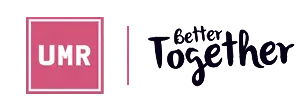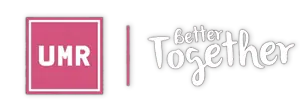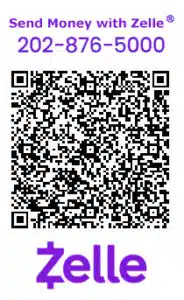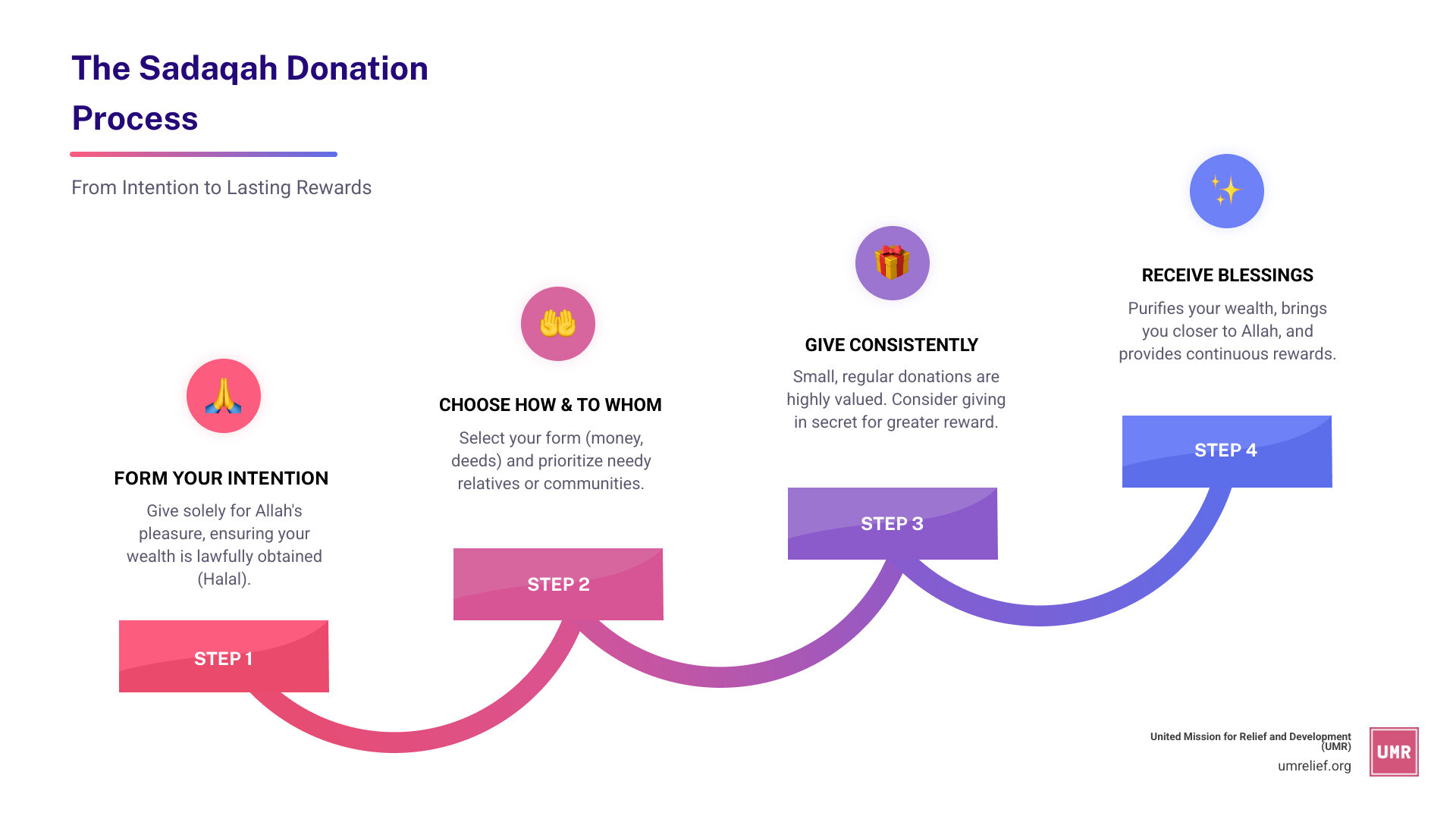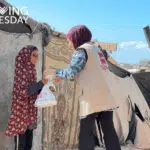How to Give Sadaqah: 5 Easy Steps for Impact 2025
Why Understanding Sadaqah Transforms Your Charitable Journey
Learning how to give sadaqah is one of the most rewarding acts in Islam, representing voluntary charity given purely for Allah’s pleasure. Here’s how you can start giving sadaqah today:
Quick Steps to Give Sadaqah:
- Make your intention (niyyah) – Give solely for Allah’s pleasure
- Choose your form – Money, good deeds, or acts of kindness
- Give from halal earnings – Ensure your wealth is lawfully obtained
- Start with family – Prioritize relatives and dependents in need
- Give consistently – Small, regular donations are better than large, infrequent ones
- Keep it private – Giving in secret increases spiritual rewards
Sadaqah, derived from the Arabic word “sidq” meaning truthfulness, reflects the sincerity of your faith. Unlike Zakat, which is obligatory, sadaqah is entirely voluntary and can be given at any time in any amount.
The Prophet Muhammad (peace be upon him) said: “When a son of Adam dies, then his good deeds stop except for three: a Sadaqah Jariyah (continuous charity), a beneficial knowledge, or a righteous child who prays for him.” This highlights how your charitable giving can continue benefiting others long after you’re gone.
Whether you’re giving a few dollars or funding a water well, every act of sadaqah purifies your wealth and brings you closer to Allah. It also helps establish economic stability in communities by ensuring wealth flows to those who need it most.
At UMR, our experience in facilitating charitable giving and managing donor relations has provided us with profound insights into how to give sadaqah effectively and maximize its transformative impact. We’ve seen how proper guidance enriches the giver’s spiritual journey and profoundly improves the recipient’s life.
How to give sadaqah terms simplified:
- sadaka meaning
- transparent charity organization
- virtues of sadaqah
Understanding Sadaqah: The Heart of Islamic Charity
Charity means different things to different people. For many, it’s simply giving money or goods to those in need. But in Islam, charity—especially sadaqah—carries a much deeper spiritual meaning that touches your heart and transforms your relationship with Allah.
Sadaqah is worship in action. It’s your faith made visible through acts of kindness and generosity. More than just helping others, it’s a powerful tool for social justice and personal purification that brings you closer to Allah with every act of giving.
What is Sadaqah? At its heart, sadaqah is any voluntary charitable act you do for others, driven by generosity, love, compassion, or faith. Your only goal? Pleasing Allah (SWT).
The word itself tells a beautiful story. “Sadaqah” comes from “sidq,” meaning truthfulness or sincerity. This reveals something profound: true sadaqah isn’t about how much you give—it’s about the sincerity behind your gift. When you understand the sadaka meaning, you realize every sincere act of charity is a truthful expression of your faith.
But Islam offers something even more beautiful: Sadaqah Jariyah, or ongoing charity. Unlike regular sadaqah that provides immediate help, Sadaqah Jariyah keeps giving benefits long after your initial act. What is Sadaqah Jariyah? It’s charity that continues to benefit people for years, even after you’ve passed away.
Remember the hadith we shared earlier? Sadaqah Jariyah is one of only three deeds that keep earning you rewards after death. It’s like planting a tree that keeps bearing fruit for generations. This concept beautifully aligns with modern sustainable development—creating lasting positive change that transforms communities.
The Key Differences: Sadaqah vs. Sadaqah Jariyah
Understanding how to give sadaqah effectively means knowing when to choose immediate help versus long-term impact. Both forms of charity are voluntary and beautiful, but they serve different purposes.
Regular sadaqah provides immediate relief. When you give a meal to someone hungry, donate clothes to those in need, or offer cash to help with urgent expenses, you’re meeting pressing needs right now. The spiritual rewards come from that single act of kindness.
Sadaqah Jariyah creates lasting change. Building a water well, constructing a school, sponsoring an orphan’s education, or planting trees—these gifts keep giving. Every time someone drinks clean water from that well or a child learns to read in that school, you earn more spiritual rewards. The benefits continue flowing, sometimes for decades.
| Feature | Sadaqah (General Charity) | Sadaqah Jariyah (Ongoing Charity) |
|---|---|---|
| Duration of Benefit | Short-term, immediate impact | Long-term, continuous benefit |
| Examples | Giving a meal to a hungry person, donating clothes, a cash gift | Building a water well, constructing a school, planting a tree, sponsoring an orphan’s education |
| Reward Timeline | Rewards are typically received for the initial act of giving | Rewards continue to accrue for as long as the benefit lasts, even after the giver’s death |
Sadaqah vs. Zakat: What You Need to Know
Many people wonder about the difference between sadaqah and zakat. Both are forms of Islamic charity, but they serve different roles in your spiritual life.
Zakat is your religious obligation. As one of the Five Pillars of Islam, every adult Muslim who meets specific wealth criteria must pay zakat annually. It has strict calculation rules, specific timing requirements, and designated recipients. Think of zakat as your spiritual tax—it purifies your wealth and fulfills your duty to Allah.
Sadaqah is your voluntary expression of gratitude and compassion. There are no fixed amounts, no specific deadlines, and you can give to anyone in need—even non-Muslims. While zakat purifies your wealth from a religious obligation standpoint, sadaqah goes further by expressing your gratitude to Allah and strengthening your faith through acts of kindness.
Both are essential parts of learning how to give sadaqah and building a complete charitable practice. Zakat ensures you meet your minimum obligations, while sadaqah allows your generous heart to flourish beyond requirements.
The Transformative Benefits of Giving Sadaqah
When you learn how to give sadaqah, you’re not just helping others – you’re opening the door to incredible blessings that touch every part of your life. The beauty of sadaqah lies in how it transforms both the giver and receiver in ways that ripple far beyond the initial act.
The spiritual rewards of giving sadaqah are truly remarkable. Islamic teachings tell us that charity has the power to avert calamity from our lives – imagine having that kind of divine protection! Even more amazing, sadaqah is believed to increase your sustenance and bring unexpected blessings. It’s like planting seeds that grow into abundance you never expected.
Perhaps most comforting of all, sadaqah serves as a means for forgiveness of sins. The Prophet (peace be upon him) taught us that “Sadaqah extinguishes sin as water extinguishes fire.” Think about that powerful image – your simple act of giving can wash away mistakes and purify your heart.
On the Day of Judgment, when the sun will be unbearably close, believers will find shade in their charity. Your sadaqah today becomes your comfort in the hereafter. These profound The Virtues of Sadaqah show us why giving holds such a special place in Islam.
But the benefits don’t stop with personal rewards. When you give sadaqah, you’re helping build stronger, more caring communities. Your donation creates a natural flow of wealth in society, making sure resources reach families who need them most. This reduces poverty and creates economic stability that benefits everyone.
The community impact is especially powerful. Sadaqah bonds people together, creating a sense of shared responsibility where everyone looks out for each other. It’s beautiful how one person’s generosity can strengthen an entire community’s social welfare.
At UMR, we witness this change daily as we support communities in Jordan, Palestine, Lebanon, and Yemen. The Importance of Charity in Islam becomes crystal clear when you see how it creates lasting change.
Our commitment to transparency means your sadaqah works harder. In 2023, 90¢ from every dollar donated went directly to programs serving those in need. This efficiency ensures your charity creates maximum impact on the ground, helping us ease suffering for millions of people.
The numbers speak for themselves – in 2024 alone, we helped 17 million people across 34 countries. That’s the collective power of sadaqah at work, changing lives one donation at a time.
A Practical Guide on How to Give Sadaqah
Learning how to give sadaqah effectively starts with understanding the Islamic guidelines that make our charitable acts both meaningful and spiritually rewarding. These principles aren’t just rules—they’re wisdom that helps us give in ways that truly benefit everyone involved.
The most important aspect of giving Sadaqah is sincerity (Ikhlas). Your heart needs to be in the right place. When you give, it should be purely for Allah’s pleasure, not because you want people to think you’re generous or because you’re hoping for something in return. This sincerity transforms a simple donation into an act of worship.
Giving from Halal earnings is equally crucial. Allah doesn’t accept charity from wealth that was earned through dishonest means. It’s like trying to clean something with dirty water—it just doesn’t work. Your earnings need to be lawful and pure for your Sadaqah to be accepted.
Here’s something beautiful about Islamic charity: giving in secret often carries more spiritual weight than giving openly. The Prophet (peace be upon him) mentioned that among the seven people Allah will shade on the Day of Judgment is “a man who gives in charity and hides it, such that his left hand does not know what his right hand has given.” This doesn’t mean you can never give publicly—sometimes giving openly encourages others to be charitable too. But there’s special virtue in quiet generosity that protects both your sincerity and the recipient’s dignity.
Don’t delay your charity once you’ve decided to give. We’ve all been there—you see a need, feel moved to help, then think “I’ll do it tomorrow” or “I’ll give when I get my next paycheck.” But opportunities can disappear, and procrastination can weaken our good intentions. When your heart tells you to give, listen to it.
Prioritizing relatives might surprise some people, but Islam teaches that charity begins at home. If your own family members, parents, or close relatives are struggling, they should be your first priority. This doesn’t mean you can’t help others—it means you take care of your inner circle first, then expand outward.
Forms of Giving: More Than Just Money
One of the most liberating truths about how to give sadaqah is that it’s not limited to your bank account. The Prophet (peace be upon him) taught us that charity comes in countless forms, making it accessible to absolutely everyone.
A genuine smile is charity. Think about that for a moment—something as simple as brightening someone’s day with a warm smile counts as Sadaqah. A kind word when someone needs encouragement, removing a stone from a path where people might trip, sharing knowledge that helps someone learn something new, or volunteering your time at a local shelter—all of these are forms of charity.
This means a student struggling financially can still give Sadaqah by helping classmates with their studies. A busy parent can give Sadaqah by offering patient advice to another parent. An elderly person can give Sadaqah through their prayers and wisdom. Nobody is excluded from this beautiful act of worship.
The Best Times to Give Your Sadaqah
While you can give Sadaqah any day of the year, certain times offer multiplied rewards that make your charity even more impactful.
Ramadan stands out as the most blessed time for giving. The Prophet (peace be upon him) was incredibly generous during this holy month, and the spiritual rewards for charitable acts are magnified. We’ve seen this at UMR—donors often choose Ramadan to make their most significant contributions, knowing their impact will be greater. The Benefits of Giving Zakat and Sadaqah in Ramadan explains why this timing is so powerful.
The first ten days of Dhul Hijjah are considered even more sacred than Ramadan in some aspects. These days, leading up to Eid al-Adha, are perfect for significant charitable acts.
Times of crisis create urgent opportunities for Sadaqah. When disasters strike or conflicts escalate, your charity can literally save lives. At UMR, we’ve coordinated emergency relief in Gaza, Sudan, and Yemen, where timely donations meant the difference between hope and despair for families.
But honestly, any day you feel moved to give is the perfect day. Consistency matters more than timing. Small, regular acts of charity often bring more blessing than large, infrequent donations.
Practical Steps on How to Give Sadaqah
Ready to start giving? Here’s your simple roadmap for how to give sadaqah effectively:
Assess your capacity honestly. Whether it’s money, time, or skills, figure out what you can realistically offer without putting yourself in hardship. Even the smallest sincere act counts.
Identify genuine needs around you. This might be a neighbor struggling with groceries, international humanitarian crises you read about, or community projects like building wells or schools. Keep your eyes open—opportunities are everywhere.
Choose your method based on what feels right. You might donate online through organizations like UMR, hand cash directly to someone in need, volunteer at a local charity, or simply perform daily acts of kindness.
Make your intention (niyyah) clear in your heart. Before you act, take a moment to affirm that you’re doing this purely for Allah’s sake. This internal intention transforms your action into worship.
Follow through completely. If you’re donating money, make sure the transaction is secure and reaches its destination. If you’re performing a good deed, do it with genuine kindness and humility.
The beauty of Sadaqah lies in its simplicity and accessibility. You don’t need to be wealthy or wait for special occasions. Every day offers chances to give, whether through your wallet, your time, or your heart.
Maximizing Your Impact: Where and How to Give Effectively
When you’re learning how to give sadaqah, one of the most important questions is: how can you make sure your donation creates the biggest positive change? It’s not just about givingit’s about giving wisely.
The key is choosing reputable organizations that handle your donations with care and transparency. Think of it this way: you wouldn’t hand your money to a stranger on the street, so why would you donate without doing a little homework first?
Look for charities that openly share how they spend your money. At UMR, we’re proud to show that 90 cents from every dollar goes directly to helping people in need. Only 4 cents covers administrative costs, and 6 cents supports fundraising efforts. This means when you give $100, $90 is actually reaching the families and communities who need it most.
Supporting sustainable projects makes your sadaqah work even harder. When you fund a water well, for example, you’re not just helping one person for one day. You’re providing clean water for entire communities for years to come. That single act of charity keeps giving benefits long after you’ve made the donationexactly what Sadaqah Jariyah is all about.
Examples of High-Impact Sadaqah Jariyah Projects
The beauty of Sadaqah Jariyah lies in its lasting impact. These projects keep blessing both the recipients and you, the giver, for years to come.
Building water wells transforms entire communities overnight. Suddenly, childrenespecially girlscan attend school instead of walking hours to fetch water. Families stay healthier because they have clean water to drink. Farmers can grow more food. One well creates a ripple effect of positive change. Our Sadaqah Jariyah Water Well projects have brought this life-changing resource to countless communities.
Constructing schools or clinics gives communities the foundation they need to thrive. A school means children get education that lifts them out of poverty. A clinic means mothers can safely give birth and families can get medical care when they need it most.
Sponsoring an orphan’s education is one of the most personal ways to create lasting change. You’re not just paying for books and uniformsyou’re giving a child hope and a future. Many of these children grow up to become doctors, teachers, and leaders in their communities.
Establishing farms and supporting small businesses help families become self-sufficient. When you help a widow start a small business, she can feed her children and send them to school. When you support a farming project, entire villages can eat better and earn money from their crops.
Ensuring Your Donation is Used Effectively
Nobody wants their hard-earned money wasted, especially when it’s meant to help people in desperate need. Here’s how to give sadaqah with confidence.
Start by researching charities before you donate. Look for organizations with clear track records and positive reviews. Websites like Charity Navigator can give you valuable insights into how well a charity manages its money and serves its mission.
Check if your donation is tax-deductible, which can make your giving go even further. In Canada, you can learn more about tax-deductible contributions through the government website.
Follow up on projects when possible. The best charities will keep you updated on how your donation is making a difference. They’ll share photos, stories, and progress reports that show your money at work. This transparency builds trust and shows you that your sadaqah is truly changing lives.
At UMR, we make it easy to track your impact. When you Donate Sadaqah Online with us, you become part of a community committed to transparent, sustainable aid. We believe you deserve to see exactly how your generosity is changing communities across 34 countries.
Frequently Asked Questions about Giving Sadaqah
Understanding how to give sadaqah often brings up questions about sincerity, recipients, and amounts. These are natural concerns that reflect your desire to give in the most meaningful way possible. Let me address the most common questions I hear from donors who want to ensure their charitable giving aligns with Islamic principles.
How can I ensure my Sadaqah is sincere and accepted by Allah?
Your niyyah (intention) is everything when it comes to Sadaqah acceptance. The key is giving for Allah’s pleasure alone, not for recognition, praise, or any worldly benefit. It’s that simple, yet sometimes challenging in our social media age where everything gets shared.
Avoiding arrogance is equally important. Don’t boast about your charity or make the recipient feel indebted to you. You’re the one receiving the blessing through this opportunity to give. The moment we start seeking praise from others, we risk losing the spiritual rewards entirely.
Your wealth must also be pure and lawful (Halal). As the Hadith beautifully states: “Allah is pure and accepts only that which is pure.” This means your earnings should come from legitimate sources – no shortcuts or questionable income. When you combine pure intention with pure earnings, you create the perfect conditions for accepted Sadaqah.
The beauty is in the simplicity: give sincerely, give from what’s rightfully yours, and give without expecting anything in return except Allah’s pleasure.
Can Sadaqah be given to anyone, including non-Muslims?
Absolutely yes! This is one of the beautiful differences between Sadaqah and Zakat. While Zakat has specific recipient categories outlined in Islamic law, Sadaqah can be given to anyone in need, regardless of their faith, nationality, or background.
The general principle is simple: alleviate suffering wherever you find it. The Prophet Muhammad (peace be upon him) demonstrated this universal compassion through his own generous treatment of non-Muslims. These Prophetic examples show us that charity builds bridges and fosters good relations between different communities.
That said, prioritizing the needy in your immediate circle is encouraged. Start with relatives and dependents who need help, then extend to your local community, and then to the broader world. This approach ensures those closest to you are cared for while still allowing you to help others.
Your Sadaqah becomes a powerful tool for fostering good relations and showing the compassionate face of Islam to people of all backgrounds.
Is there a minimum or maximum amount for Sadaqah?
Here’s the wonderful news: there’s no set amount for Sadaqah! This accessibility makes it one of the most inclusive forms of worship in Islam. Whether you have $5 or $5,000 to give, both amounts carry equal spiritual weight when given with sincerity.
Give what’s within your means without causing hardship to yourself or your family. The Prophet (peace be upon him) encouraged giving even “half a date” in charity, showing that the value of small, consistent acts often surpasses large, infrequent donations.
Think of it like this: someone giving $10 monthly from a tight budget might receive greater spiritual rewards than someone giving $1,000 once a year from abundance. It’s about the sacrifice and consistency, not the dollar amount.
The Prophet’s encouragement of any amount means your contribution matters, regardless of size. At UMR, we’ve seen how small, regular donations from many people can fund entire water wells or school buildings. Your “small” gift combines with others to create massive impact.
The key is to start where you are, with what you have, and give regularly. Don’t wait until you have “enough” – that day might never come, and you’ll miss countless opportunities to purify your wealth and help others.
Conclusion: Start Your Journey of Giving Today
Throughout this guide, we’ve finded that how to give sadaqah extends far beyond simply writing a check or dropping coins in a donation box. Sadaqah is a beautiful mix woven from sincere intention, diverse forms of giving, and profound spiritual rewards that touch both this life and the hereafter.
Whether you choose to offer a genuine smile to brighten someone’s day, share beneficial knowledge with a neighbor, or contribute to life-changing water wells that serve communities for generations, each act creates ripples of goodness that extend far beyond what we can imagine. The beauty of sadaqah lies in its accessibility – everyone can participate, regardless of their financial situation.
At UMR, we’ve witnessed the transformative power of collective giving. When 17 million people across 34 countries received aid in 2024 alone, it wasn’t just statistics on a report – it was mothers gaining access to clean water, children returning to school, and families rebuilding their livelihoods with dignity. Our commitment to ensuring 90¢ of every dollar reaches those in need means your sadaqah truly makes a tangible difference.
The most beautiful aspect of charitable giving is that you don’t need to wait for the “perfect moment” or the “right amount” to start. Start small, start with sincerity, and start today. Your journey of giving is ultimately a journey of faith, compassion, and hope – one that purifies your wealth while uplifting entire communities.
The Prophet (peace be upon him) encouraged us not to underestimate even the smallest acts of charity. That “half a date” given with pure intention can carry the same spiritual weight as larger donations when offered from the heart.
Ready to take your first step? Begin making a difference with your Zakat and Sadaqah and join thousands of others who are bringing hope and lasting change to millions around the world. Your sadaqah journey starts with a single, sincere act of giving.
